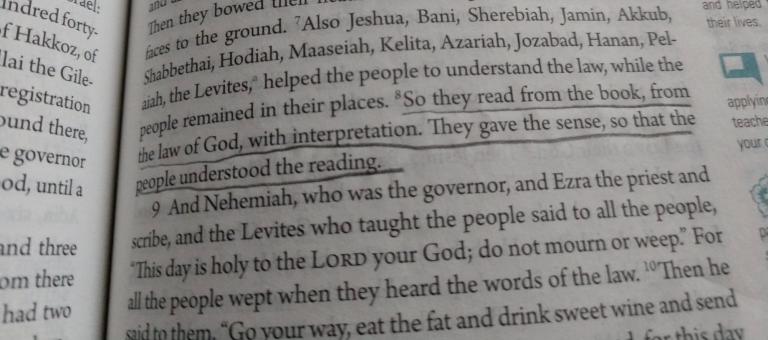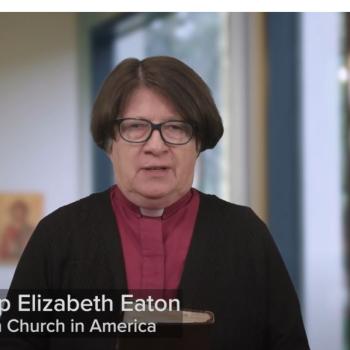What makes for ‘good preaching’? This is a sermon about sermons, about what it means to preach and listen to the Word of God.

Text: Nehemiah 8:1-10
Can you remember a sermon you once heard that touched your heart so deeply, you felt the pastor was talking directly to you?
Or how about the time when you heard a pastor preach and you felt your mind open in a way that freed you to think differently? It just changed your whole perspective on things.
Do you know what was happening in those sermons? The divine presence of God was communicating with you through the preacher, through the scripture, and through the worshiping community around you. The Holy Spirit was working on you, inviting you into a new way of feeling, thinking, and acting.
Isn’t it amazing that God uses ordinary human words – ordinary human beings – to speak to us?
When we talk about “The Word of God,” it refers to many different things. For one, it means the actual “word” that God spoke in the beginning. As we read in the first two verses of John’s Gospel, “In the beginning was the Word, and the Word was with God, and the Word was God. He was in the beginning with God.” Thus “the Word of God” is also Christ, the Word incarnate, made flesh among us. And more, “the Word” is also Scripture. In and through these words in the Bible, inspired by the work of the Holy Spirit and written by humans (as imperfect as they are), we can encounter God.
Preaching, too, is the Word of God.
It is the living Word interpreted for this time and place by this particular preacher for this particular congregation. In the preaching event we see all aspects of the Word coalesce. God’s Word in Scripture is incarnated once again in the interpretation of the preacher and in his or her relationship with the congregation, which is yet another manifestation of the Spirit of Christ.
You and I are God’s Word, because we were spoken into existence as a Christian community by the words of Baptism and Holy Communion. And when we gather around the font and table, and around words of Scripture, two things happen. We read them, but they also read us. They shape us as individuals and as a gathered people of God.
These Words in the Bible are not dead words of ancient times that have no meaning today. This is not a museum book. It is meant to be the living Word of God. And it is through the ongoing, fresh and contemporary work of preaching that the Word comes alive in the speaking and the hearing.
In Nehemiah Chapter 8, we see that the people of Israel found out just how powerful the Word of God – including preaching – can be.
They had been held captive in the Babylonian exile where practicing their faith was forbidden and they were subjected to slavery and oppression. They didn’t know who they were because they had no access to the ancient words that helped them understand their identity as children of God. They didn’t know the biblical narratives that told them who they were. They didn’t know God’s law, the Ten Commandments, or the sacred words of worship for their liturgies.
But now they have returned to Jerusalem to reestablish their homes, their community, and their worship of God. So Ezra – a priest and scribe – gathered all the people together. It was their first time to hear the Torah read to them in a generation. All the men and women and children sat down in the gathering space, much like we do every Sunday, and they listened. They were hungry for the Word of God.
So they read from the book, from the law of God, with interpretation. They gave the sense, so that the people understood the reading. (Neh. 8:8)
In other words, there was a sermon!
In fact, there were many sermons, because Ezra appointed thirteen preachers to instruct the people about what the scriptures meant for them, for their lives, and for how they were to live in community with each other.

But here’s something curious. When the people heard the scripture and listened to the sermon – they cried. Has that ever happened to you? Have you ever found yourself crying during a sermon?
Have you ever listened to a sermon and you could feel yourself being broken open in a way you never had before?
All of a sudden, the tears just start flowing. You can’t control it. Something the preacher said, or something about your life at that moment, or something about the way the Holy Spirit worked on you just crumbled your defenses and laid you wide open.
That has happened to me on a few occasions. I’ll tell you about just one.
I was listening to Rev. Dr. Barbara Lundblad preach at the Festival of Homiletics many years ago. She was telling about an experience of being in a church that had a profound ministry of welcome for people with disabilities. She described a communion service where every single person was accommodated according to their needs. Those who were blind; those who were in wheelchairs; those with brain injuries – all manner of people who struggle to find a place at the table in the church were welcomed, and given leadership roles, and elevated to their full human expression of God’s grace.
As she described this scene, I was overcome with tears because this sermon pierced my heart.
Here’s why. One of my sisters was born with severe physical disabilities and was wheelchair bound all her life. My relationship with her was complicated and strained. I’m ashamed to admit that I often regarded her as a burden on our family. She struggled with addictions and finding acceptance. By the time she took her own life in her late twenties, we were not on speaking terms.
Barbara Lundblad did not know this, of course. But when she described this scene of complete welcome at that church and empowerment of all these people with disabilities, I was brought to my knees in a rush of guilt and remorse about my sister’s life and our relationship. I just had never thought of things in this way – a whole faith community working to restore humanity to those deemed less than fully human. The way I saw the world, the way I saw my sister, the way I saw people with physical impairments, the way I saw the church – all of it shifted because of that sermon. My regret at not having realized this sooner – while my sister was still alive – spilled from my eyes and rent the garment of my heart.
At the same time I was weeping, however, this sermon filled me with a sense of God’s grace.
She showed me a vision of the kingdom of God where all children of all kinds are welcomed. I was able to take a step forward in finding peace with my sister – something that I had not been able to find before that moment. That’s how God can work in a powerful sermon – filling the listener with both repentance and reconciliation from sin.
I wonder if the people of Israel also felt this mix of guilt, remorse, and hope when they heard the Word of God preached to them by the Water Gate? Did they realize they had not been treating each other as children of God? Did they have regrets about their behavior because of their lack of understanding? Is that why they wept and mourned?
Sometimes God’s Word, spoken by and through the preacher, will make your squirm by holding a mirror up to you and our world to show you how things really are.
That’s what Martin Luther called “Law.” But ultimately the purpose of preaching is to proclaim God’s presence, the grace of Jesus Christ, and the power of the Holy Spirit working in our midst. You should hear Good News in just about every sermon. That’s called “Gospel.”
And that’s exactly what Ezra and Nehemiah proclaimed to the people of Israel:
“This day is holy to the Lord your God; do not mourn or weep.” For all the people wept when they heard the words of the law. 10 Then he said to them, “Go your way, eat the fat and drink sweet wine and send portions of them to those for whom nothing is prepared, for this day is holy to our Lord; and do not be grieved, for the joy of the Lord is your strength.” (Nehemiah 8:9-10)
Homilitician John McClure says that in the preacher’s proclamation of grace “God’s will and power are identified not with what is but with what will be.” [1] This means that preaching engenders hope and cultivates faith, which is trust in God. God’s Word in and through preaching helps us to imagine a new future and gives us the means and motivation to live as if that future is already happening now.
As McClure says: “Anticipation of a new future grounded in faith in God conditions and motivates life. The Christian life is one of hope, consciousness-raising, learning from and suffering with the oppressed . . . , hope for and involvement in the work of social transformation, and joy in the present, rooted in faith’s hope for and vision of the future.” [2]

I think it’s no small thing that Ezra and Nehemiah encouraged the gathered congregation to share a meal after hearing the Word of God and the accompanying sermons. It was a meal of justice – sharing among those who had little and welcoming all to the table. Much like the scene Barbara Lundblad described in her sermon. Much like the meal of Holy Communion is intended in the church.
In fact, good preaching should also feel like a good meal, like you’ve been fed.
It should nourish your soul and your mind and your heart in some way.
Sometimes in a sermon you’ll be offered a taste of something you’ve never tried before, or something that is a little hard to chew, a little on the sour side, or a little difficult to swallow. When this happens, hopefully you’ll be able to trust that the preacher has the best intentions and your best interests – and the interest of the wider community – at heart.
Over time, a preacher develops a relationship with her or his parishioners that should help them develop and build their relationship with God.
Not every sermon can be a feel-good dessert. We need protein and veggies, fiber, and vitamins. And sometimes, we need a dose of medicine for our sin-sick souls. It may not taste good, but it can help bring healing.
Good preaching over a period of time should also offer a Word from God on many different topics, Bible passages, and theological themes. Not every sermon is going to be a gourmet meal, or a bowl of your favorite ice cream. But if it’s nourishing and has at least a little good flavoring, it will do wonders for your appetite for God’s Word.
Good preaching should keep you coming back for more.
As one churchgoer said to another, “I may not remember every meal my spouse made over the years. But I know I was fed nourishing food that sustained me day to day. In the same way, I may not remember every sermon in detail. But I know I was fed on the nourishing Word of God that sustained me week to week.”
God’s future for the Israelites started on that day when the Word of God was read and preached. God’s future for us started in the preaching, teaching, cross and resurrection of Jesus. It is the promise of the resurrection that gives us the commission and power to preach. God’s future for me started on that day when Barbara Lundblad’s sermon reached my heart. God’s future can start every time a preacher steps up to proclaim the Word of God.
“Go and make disciples,” says Jesus.
“Feed my sheep,” says Jesus.
“I am sending you,” says Jesus.
Come to God’s Word. Be fed with God’s Word. Be filled with hope and faith in God’s Word. And be sent with God’s Word, the bread of life, the light of the world.

Leah D. Schade is the Assistant Professor of Preaching and Worship at Lexington Theological Seminary (Kentucky) and author of the book Creation-Crisis Preaching: Ecology, Theology, and the Pulpit (Chalice Press, 2015).
Twitter: @LeahSchade
Facebook: https://www.facebook.com/LeahDSchade/
Read also:
Preaching as Resistance: Encountering Pharaoh—and Climate Change
Preaching Trees: Healthy Trees, Healthy People, Healthy Faith, Wk. 5
Preaching Across Divides: Purple Zone Strategies for Pulpit and Public Square
Preaching in the Purple Zone: Sneak Preview, Pre-Order Today!
[1] John S. McClure, Other-Wise Preaching: A Postmodern Ethic for Homiletics (St. Louis, MI: Chalice Press, 2001), 137.
[2] Ibid., 137.













